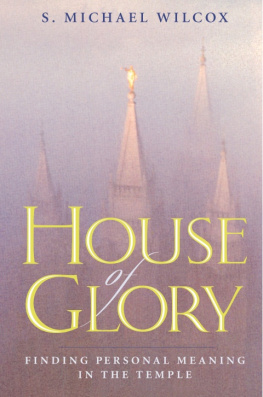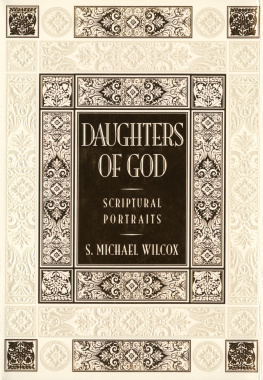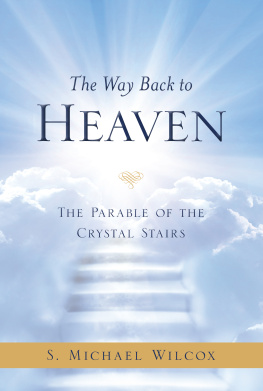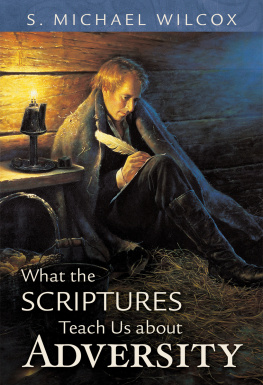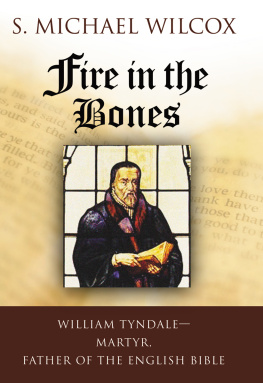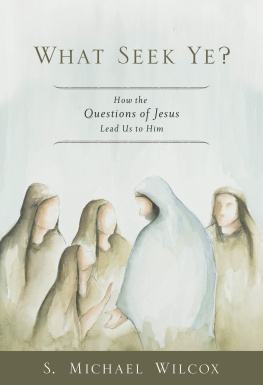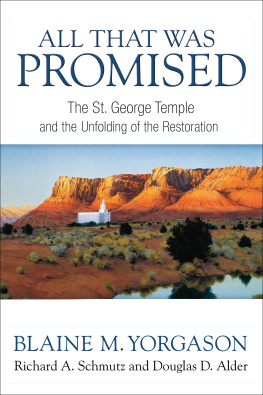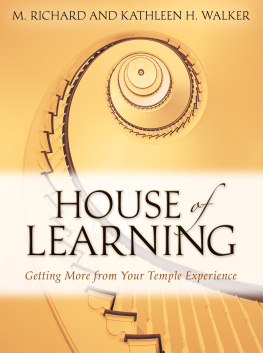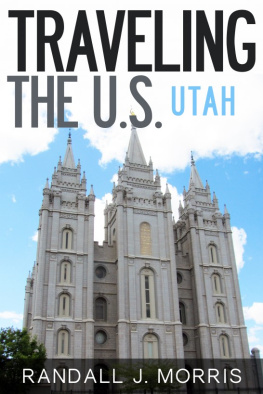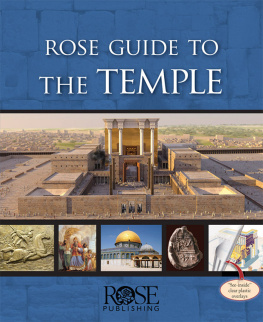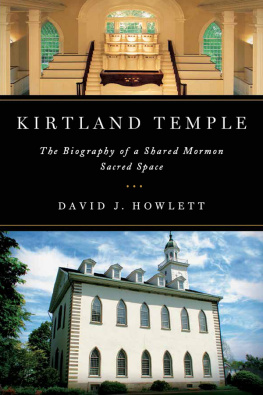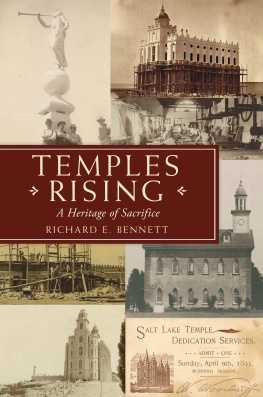House of Glory
Finding Personal Meaning in the Temple
S. Michael Wilcox
1995 S. Michael Wilcox.
All rights reserved. No part of this book may be reproduced in any form or by any means without permission in writing from the publisher, Deseret Book Company, P.O. Box 30178, Salt Lake City Utah 84130. This work is not an official publication of The Church of Jesus Christ of Latter-day Saints. The views expressed herein are the responsibility of the author and do not necessarily represent the position of the Church or of Deseret Book. Deseret Book is a registered trademark of Deseret Book Company.
PREFACE
"The Luckiest Boy"
Recently I returned to my boyhood home of San Bernardino, California. As I walked down the streets reflecting on my youth, many thoughts and emotions returned. I remembered all the insecurities and fears of my youth, especially those associated with my teenage years. I was small and often the object of bullying by boys older and bigger than I. During those years I did not consider myself as being very lucky, and I often envied others whose accomplishments or advantages seemed so desirable. I thought, "Thank heaven those days are over; I would not like to relive them again." I suppose I gave way to a good dose of self-pity.
My reflections continued for some time along these lines until finally the Spirit whispered a surprising and wholly unexpected truth. "You were the luckiest boy ever to grow up in San Bernardino," the Spirit said. The words came so powerfully and clearly that I could not mistake the source, but I did not believe the words that were spoken. "Not so! Not so!" I answered. "I was not the luckiest boy! How could I have been, considering all the experiences I remember?"
Once again, clear and strong, came the Spirit's peaceful voice: "You had the fullness of the gospel of Jesus Christ and a mother who knew it was true!" As I received this truth, I saw my youth clearly for the first time in my life. I was in reality the luckiest boy who ever grew up in San Bernardino, California, but I could not have accepted this truth until my life had shown me all the glorious aspects of the Savior's light.
This book is about only one ray of that light, that of the holy
temple. It is a ray I have come to love deeply. If, among all the wonderful, edifying subjects that belong to the gospel, all I ever knew was the temple, I would still have been the luckiest and most blessed boy. Its blessings alone are sufficient to render us all the most blessed people to inhabit the earth. That we receive so many other blessings with it is but a testimony of the grace and mercy of a compassionate and loving Father in Heaven. Against the backdrop of all the glorious blessings of the gospel, the temple stands out, to use Joseph Smith's words, as "this most glorious of all subjects belonging to the everlasting gospel." (D&C 128:17.)
I do not have a sufficient gift to describe all the glories of the gospel. Even John said the whole "world itself could not contain the books that should be written" (John 21:25) if all the teachings and beauty of the Savior's life and gospel were recorded. I am afraid I do not have the ability to write about even one aspect of the gospel, let alone that which is described as the most glorious. I have hesitated for a long time to attempt to speak or write about the temple. Perhaps others whose powers and gifts are far greater than mine would still not be able to do sufficient justice to so wonderful a topic, but my deep interest in the temple has urged me to make the attempt, perhaps only for my own clarification and edification. I hoped, as I commenced, that the Lord surely would not withhold his blessing on the labors of one who loved his subject so freely.
Regardless of the outcome, the labor itself has brought me many returns. I have often felt as Frederic Farrar did while attempting to write The Life of Christ. He too felt overwhelmed by his topic. In his preface he writes: "Whether this book be... blessed to high ends, or whether it be received with harshness and indifference, nothing at least can rob me of the deep and constant happiness which I have felt during almost every hour that has been spent upon it.... Even in the midst of incessant labor at other things, nothing forbade that the subject on which I was engaged should be often in my thoughts, or that I should find in it a source of peace and happiness different, alike in kind and in degree, from any which other interests could either give or take away." (The Life of Christ, p. 2.)
CHAPTER 1
How High a Priority?
While I was teaching at BYU, I had the opportunity to participate in the inauguration of President Rex E. Lee. It was a wonderful occasion. On Friday morning the faculty, dressed in the robes of academia, waited in the parking lot for the processional to begin. At a given signal we all marched into the Marriott Center and took our seats. Thousands of students entered, and soon the auditorium was filled. All were excited, and the atmosphere of the Marriott Center was one of general anticipation.
Numerous dignitaries from the state and community arrived, taking their seats of honor. Finally a number of the General Authorities, including members of the First Presidency, arrived with President Lee. They took their seats on the stand, and the meeting began. It was truly an exciting and important event, and I felt privileged to be part of it.
As the ceremonies continued, I realized that among all the dignitaries and officials, President Ezra Taft Benson was not in attendance. I wondered if his health was failing and, therefore, he could not attend. I had heard him speak recently, and he had seemed vigorous and strong. Were there other meetings or duties he needed to attend to as he carried the weight of his prophetic mantle?
The inauguration lasted several hours. It was interesting and edifying, but I took home a tiny, nagging thought: Where was President Benson?
The next Friday, I attended a special ward endowment session in the Jordan River Temple. Before participating in the ordinances, we had the opportunity to listen to a member of the temple presidency. In his remarks I found an answer to my puzzlement of the week before. As well as I can remember, this is what he told us: "Every Friday morning, President and Sister Benson come to the Jordan River Temple to participate in an endowment session. We meet them at a private door and help them prepare for their session. Last Friday we assumed they would not attend the temple as they normally do because of the inauguration of President Lee at Brigham Young University.
"To our surprise they arrived at their usual hour, and we were not prepared to greet them and offer our customary assistance. We apologized, telling President Benson we enjoyed greeting them and helping them but had thought they would be at BYU. President Benson smiled and asked: 'What day is it?' 'Friday,' we answered. Then he replied 'Friday is my temple day. Where else would I be on a Friday morning?'"
As I listened to this tiny but wonderful story from the life of the president of the Church, I couldn't help but marvel at the power of his example. To the inauguration of the president of a great university, an event that takes place maybe once every ten years, President Benson could send a counselor. He, himself, would attend an ordinary endowment session in the Jordan River Temple as was his custom. That morning he chose to wear the sacred clothing of the temple rather than the honored robes of academia.

